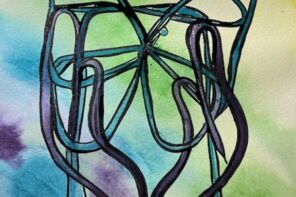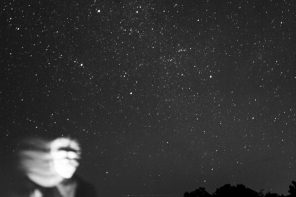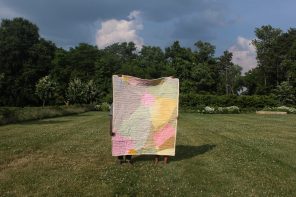Asali Solomon is the author of the short story collection Get Down (Farrar, Straus & Giroux, 2008), for which she received the Rona Jaffe Foundation Writer’s Award and the National Book Foundation’s “5 Under 35” distinction. Her debut novel, Disgruntled (Farrar, Straus & Giroux, 2015), was named one of the best books of 2015 by the San Francisco Chronicle and the Denver Post. A Philadelphia native, Solomon is an Associate Professor of English at Haverford College. Her work has appeared in the Kenyon Review, O: The Oprah Magazine, Vibe, Essence, the Paris Review Daily, and the anthology Naked: Black Women Bare All About Their Skin, Hair, Lips and Other Parts.
Solomon and I sat down in the conference room of Washington University’s English Department to discuss writing rituals, the particularity of black Philadelphia, and disgruntlement as a rite of passage.
Charles Ramsay McCrory: In your novel, Disgruntled (Picador, 2016), the father, Johnbrown, is at work on The Key, which he purports to be a groundbreaking work of black philosophy. It’s also very much about Julian Carlton, a notoriously disgruntled black employee of Frank Lloyd Wright. Are there historical figures, who are perhaps not writers, who serve as touchstones or guides for your own work?
Asali Solomon: When I was young, my parents would talk about various black people who had achieved things, so I spent a lot of time thinking about Matthew Henson, the black Arctic explorer, and Charles Drew, and other black historical figures who were a big part of my life. But it’s hard for me to think of myself outside of a lineage of writing. The people who I think about not as touchstones but as legends that I can only hope to be mentioned in the same breath as, include the poet Lucille Clifton, who was extremely prolific. She wrote incredible poetry, she was known as an extremely generous teacher and person, she had six kids, and a lot of the time lived a very working-class life. These kinds of heroes include Sonia Sanchez, who still writes poetry; she’s a major pillar of the Black Arts Movement, of the idea that artists should be activists and put themselves on the line for things that are much greater than they are.
There’s a black visual artist, Elizabeth Catlett, who died a few years ago. She was blacklisted for her activism in the U.S., but she moved to Mexico and divorced her husband, who was a famous and extremely well-regarded artist and kind of a sexist. She moved to Mexico and married a man who took care of the house and child while she worked on her visual art. Somebody like that really captures my imagination. But a lot of the people I think about are writers who—unlike me—weren’t people who needed to have things a certain way to do the writing, but lived a hectic and politically engaged life.
CRM: Makes me think of Toni Morrison writing part of the first draft of The Bluest Eye (Holt McDougal, 1970) around her baby son’s spit-up. He spit up on her draft and she just wrote around it.
AS: Yeah. And she was a single parent; when she started, she had a career, and just the idea that people can do these things is inspiring.
CRM: Your fiction is set primarily in Philadelphia and its suburbs. What might we lose if the setting were instead some other American city?
AS: I think almost anybody who comes from a place can make wherever they come from a mythological setting, and the person I’m most inspired by in this is Edward P. Jones, who has written this world of stories in Washington, D.C. in the fifties, and he makes it the center of the universe. From him I became interested in the idea of repeatedly writing about Philadelphia, but the argument I have made to people about Philadelphia has to do with something I felt I wasn’t reading about in fiction, and that is the great diversity of the black people in Philadelphia. Philadelphia is, I think, the poorest major city in the United States, and it has traditionally had a major black population. It could easily be flatly reduced to a place that has a lot of “ghetto” neighborhoods, instead of thinking about the rich mix of working class, middle class, and black poor that often occupy the same neighborhoods.
But in addition to the class diversity among black people in Philadelphia, there’s also a really rich diversity of point of view, or predilection. A big strain in my family was politically engaged, but also hippie-eccentric—I had an aunt who introduced me to the exotic practice of drinking room-temperature spring water. A lot of this really—at the time—appalling health food before that was fashionable anywhere outside of northern California, and aligning these peculiar eating habits with a kind of militant racial worldview, or a sort of syncretized spirituality that brought together vaguely West African practices with abiding interest in the rapper KRS-One. And Philadelphia has been the locus of some pretty well-documented black activism and black eccentricity, and those things come together really tragically in the MOVE story [the 1985 police bombing of MOVE, a black liberation group], which is a kind of story that would only take place in Philadelphia for me, bringing together black political radicalism, eccentricity, and back-to-naturism, coming directly in confrontation with really deep-seated tribal white racism in the city. Also in terms of thinking about MOVE, there was a burgeoning black middle-class power in the form of our first black mayor, who chartered the city when this tragedy happened.
There’s so much black conservative Christianity in Philadelphia, but then there’s also what I’m talking about, and then there’s also secular middle-class striving. A lot of that stuff is what animates what I’m writing about, and makes the case for why I keep going back to the same setting.
CRM: Softball: what’s your favorite thing about Philly?
AS: My favorite thing about Philly is that it’s a big, interesting city, with a lot of black and brown people who are visible.
CRM: What is your process like? Do you write at the same time every day? Do you have any rituals?
AS: I don’t write at the same time every day because I cannot possibly write every day [laughs], either for reasons of schedule, or because I was never the kind of person who could—I mean, I would try, when I was in my MFA program I definitely made attempts at that, but that’s never been the way that I worked. The rituals I have are very dry, which are that, if I’m writing in earnest, I sit down and set a timer for 45 minutes, and I write, trying not to do anything else for 45 minutes. This becomes important especially now, when I could be clicking around on websites, or texting, and I try not to do that for 45 minutes and then, when the timer goes off, I take a 15-minute break and set back to it again for 45 minutes and take a 15-minute break. If I get two or three of these in a day, then that’s my day. But that’s pretty much all in terms of rituals; there’s nothing mystical about it.
When I was writing a PhD dissertation, there was a popular book going around—How to Write Your Dissertation in 15 Minutes a Day or something like that—and it had a tip in there about using a timer, and so I would get together with these other women and do that every day in order to get through our dissertations. I’ve kept that method for when I’m getting serious.
CRM: You’ve said that everything interesting in Disgruntled you invented, while everything mundane was drawn from your own life. Does inventing the explosive events help you organize the autobiographical material?
AS: I guess that’s a way of thinking about it, but the other way of thinking about it is that a thing I’ve struggled with in writing that book was the idea of plot. Like a lot of people, I was trying writing stories, but because of the demands of the market, I needed to write a novel in order to move forward with my career. I sort of rebelled—I did not actually like the idea of writing a novel. I felt like it was easier for me to write stories because the plot of a story is very narrow in scope, and plot is artificial. Now, stories are also artificial, but I was fixated on this idea that real life is more easily portrayed in a story because the arc is subtle, because real life doesn’t have any plot at all. Maybe on your deathbed you can look back and say, oh, well that was the arc and this was what happened . . .
The explosive events that I make up are ways to move the plot forward, and I think the way you stated this was pretty elegant, because a lot of things that I want to write about in literature are things I witnessed or observed or heard about, but writing towards those things, you need to have some kind of momentum. These big events provide that momentum.
For a lot of writers, the default mode is to create an observant, neutral character to whom things happen; they are a victim of all of their circumstances. The thing I also realized was crucial to writing a novel is creating somebody who has a strong effect on the things around them, even if that person is a child. In terms of thinking about the explosive events in Disgruntled or even in the stories, there are acts of betrayal that happen, and I think my goal there was to create a character who—in some ways, unlike myself—has a strong effect on their environment, but I want to say that sometimes when writers do that, they are also somewhat subconsciously absolving themselves of responsibility for a lot of things they have actually done.
CRM: We see Kenya becoming increasingly disgruntled over the course of the novel. Is disgruntlement a necessary process of coming of age?
AS: I would say definitely. I think a lot of us are raised by our parents to take on the idea of their enemies as our enemies, and that cements our identification with them. I think Kenya early on identifies a number of adversaries, and thinks of herself in an adversarial relationship with a number of people and with certain kinds of hierarchical systems, but what she comes to do over the course of the novel is realize the ways that her parents are her adversaries as well. That’s the idea of teenage and college rebellion—I think a lot of us are trained into a pretty uncritical acceptance of something, whether it’s our parents’ ideas, our religion, like some people are raised in an uncritical acceptance of their nation. And so the rebellion is about trying to figure out what you do accept, and what you do reject, and what you need to try to destroy, and then moving to a settled place within that, even if that settled place is one of constant rage.
CRM: The novel presents various modes of black response to living in a racist society, from Johnbrown’s disruptive tactics, to the Seven Days’ commitment to community service, to Sheila’s uneasy embrace of her and Kenya’s new life in the suburbs. Do you think the novel comes down on one side or another, or on one character’s side or another?
AS: No, I don’t. I think that the novel goes through looking at things and saying, well, no, no, no, and also further no. I’m most sympathetic to the idea of the Seven Days, but, as often happens with people, personal desires destroy that. If they were community-minded, Johnbrown and Cindalou would not have had an affair, so their approach is for me ideal but also utopian. By the end of the novel, Kenya’s figuring out how to get some distance from a lot of that stuff and where she fits into it.
CRM: What has been your favorite reaction to Disgruntled?
AS: I gave a reading at a public library in Philadelphia in a neighborhood I had really never been to—it’s a big city so there are still places I’d maybe driven through but not seen otherwise—and the audience was primarily black women of a certain age, which is rare. Partially it’s rare because I’d been invited to a lot of prep schools, and some of the bookstores I’d read at were usually of a younger audience, usually a whiter audience, and this was primarily working and middle-class black women at this library. I had read different sections, but I had never read the section where Johnbrown proposes polygamy to Sheila, which is what I read a lot of the time when I’m reading to adults. I read that section, and something exploded in the room, and the women—they were just so shocked and outraged and completely caught up in the story and just cheering for every acid thing Sheila said. That was one of the most gratifying literary experiences of my life.
I wasn’t there for this, but my parents took a trip, and my father read Disgruntled on the plane, and my mom said when he got to that part, he started laughing so hard he was choking, because my parents are not the parents in the book at all, and he was just so delighted and shocked by this character in this book. So those are two really good experiences I’ve had with it.
CRM: What do you think it is about that particular section that resonates so much with people?
AS: I think a couple of things are happening: I think for one, when the parents begin to have an argument about cheating, there’s something dramatic but very commonplace about it, and when Johnbrown proposes this thing, first of all it just comes for the reader—it’s not out of nowhere, if you think about who he is—but who has ever done that? That is really, really shocking, and a lot of people don’t necessarily like Johnbrown, but in the way that when you see somebody shameless, there’s a part of you that cheers for the human gall—that person is really doing this. Also everybody likes to see somebody who’s full of shit get told off in no uncertain terms, and it’s a cathartic moment in that way, as women who’ve probably had to put up with a lot of nonsense from men in various sectors of their lives, and I think—in that library—they really enjoyed hearing Sheila go to town.
And then, I think my father is somebody who’s had to hear us—he lived in a house with me and my mom and my sister, all women—trash various kinds of male trashiness, and he just sympathetically laughed about it, and I think there’s something weirdly cathartic about it for him too.
CRM: We’ve talked a little bit about this, but what’s next for Asali Solomon?
AS: I am writing a novel called American Dinner Party. It’s about a woman whose husband has just failed in his bid for political office, and she’s planning a dinner party to sensibly thank the people that helped him. She gets a phone call telling her he’s about to be indicted for corruption, and her appealing, middle-class life is about to fall apart. She immediately calls her mom, says they’re going to put his ass in jail, and the novel goes back and forth thinking about how she came to be who she was, because once upon a time when she went to Bryn Mawr College, she was a politically engaged lesbian heartbreaker with literary ambitions who gave up the chase of ass to be with her girlfriend, who’s another black woman. And now she finds herself in this empty marriage to this craven man who’s about to be indicted for corruption, so it goes back and forth between different moments of her life, and the night of the party, and also visits with her ex, who has really struggled over the years because she has this debilitating mental illness where she’s obsessed with historical wrongs, and just spends her days and nights seeing these historical scenes of human suffering.
The novel is in conversation with Toni Morrison’s Sula, which is a novel about black female friendship. A lot of people, when they talk about Sula, talk about its queerness, but also its extreme absence of queerness—the deliberate non-queerness of Sula. I’ve thought about that book a lot, and asked myself, if two best friends get together—what does that mean? My novel is also much more explicitly modeled on Mrs Dalloway, which is also a novel about a dinner party, sex, social climbing, memories, madness, and the end of the world. My novel is set during the end of the Obama era, a time when Americans were more hopeful about the future, and while there was this steady drumbeat of reports about what a catastrophe climate change was going to be, we still deluded ourselves that we were maybe going to avert that path, and so this novel also has that as a specter.
CRM: Wonderful. Can’t wait to read it.
Charles Ramsay McCrory is the Senior Fellow in Fiction at Washington University in St. Louis. His work has received the Mississippi Review Prize for fiction and has appeared in Evergreen Review and Southern Humanities Review.




